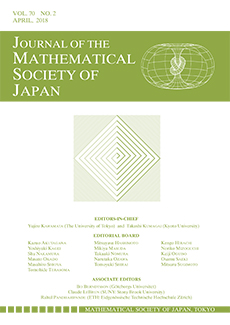Abstract
A well-known conjecture states that the kernel of representation associated to a modular fusion algebra is always a congruence subgroup. Assuming this conjecture, Eholzer studied modular fusion algebras such that the kernel of representation associated to each of them is a congruence subgroup using the fact that all irreducible representaions of are classified. He classified all strongly modular fusion algebras of dimension two, three, four and the nondegenerate ones with dimension . In this paper, we try to imitate Eholzer's work. We classify modular fusion algebras such that the kernel of representation associated to each of them is a noncongruence normal subgroup of containing an element . Among such normal subgroups, there exist infinitely many noncongruence subgroups. In a sense, they are the classes of near congruence subgroups. For such a normal subgroup , we shall show that any irreducible representation of degree not equal to 1 of is not associated to a modular fusion algebra.
Citation
Makoto TAGAMI. "Nonexistence of modular fusion algebras whose kernels are certain noncongruence subgroups." J. Math. Soc. Japan 55 (3) 681 - 693, July, 2003. https://doi.org/10.2969/jmsj/1191418997
Information





